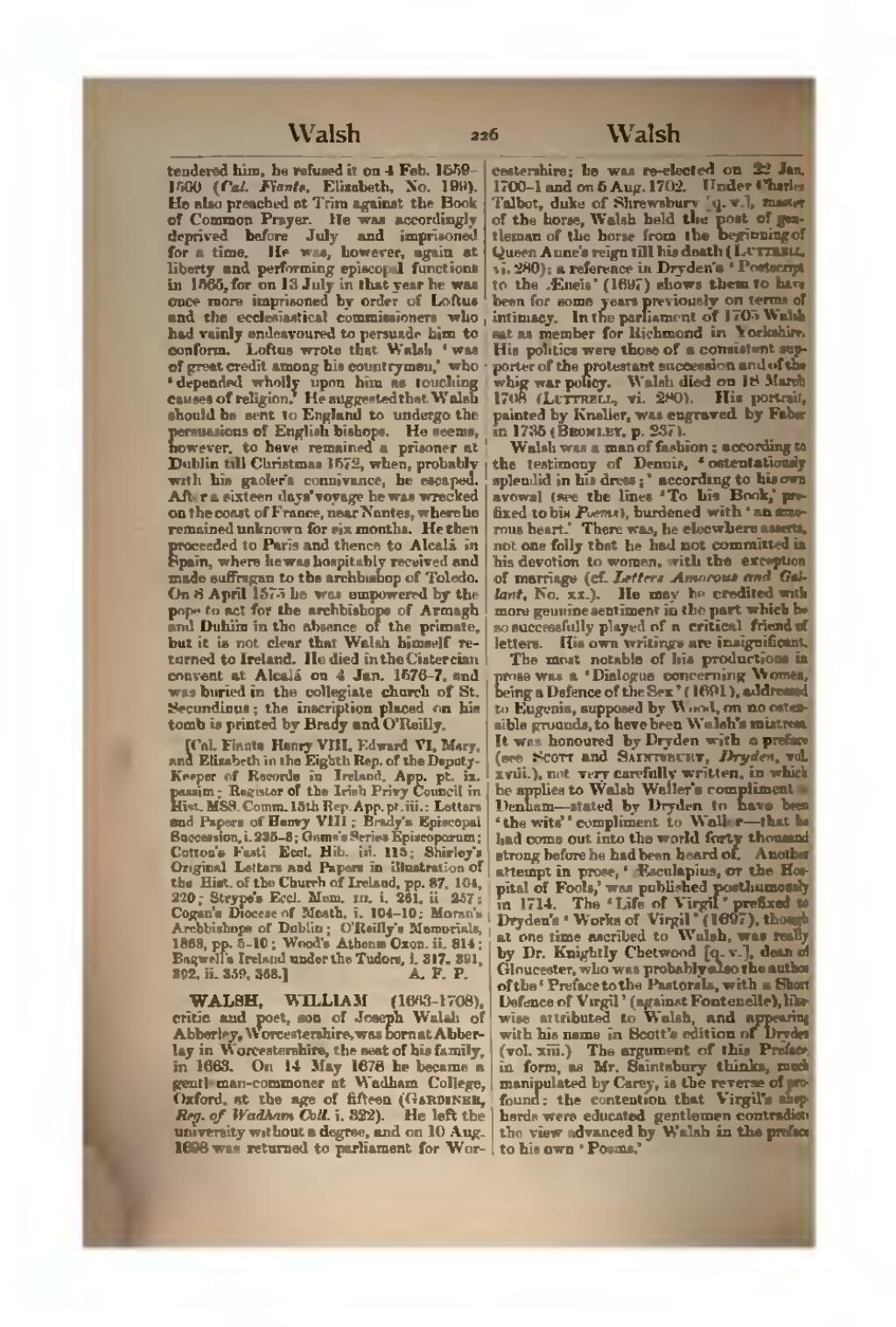tendered him, he refused it on 4 Feb. 1559–1560 (Cal. Fiants, Elizabeth, No. 199). He also preached at Trim against the Book of Common Prayer. He was accordingly deprived before July and imprisoned for a time. He was, however, again at liberty and performing episcopal functions in 1565, for on 13 July in that year he was once more imprisoned by order of Loftus and the ecclesiastical commissioners who had vainly endeavoured to persuade him to conform. Loftus wrote that Walsh ‘was of great credit among his countrymen,’ who ‘depended wholly upon him as touching causes of religion.’ He suggested that Walsh should be sent to England to undergo the persuasions of English bishops. He seems, however, to have remained a prisoner at Dublin till Christmas 1572, when, probably with his gaoler's connivance, he escaped. After a sixteen days' voyage he was wrecked on the coast of France, near Nantes, where he remained unknown for six months. He then proceeded to Paris and thence to Alcalá in Spain, where he was hospitably received and made suffragan to the archbishop of Toledo. On 8 April 1575 he was empowered by the pope to act for the archbishops of Armagh and Dublin in the absence of the primate, but it is not clear that Walsh himself returned to Ireland. He died in the Cistercian abbey at Alcalá on 4 Jan. 1576–7, and was buried in the collegiate church of St. Secundinus; the inscription placed on his tomb is printed by Brady and O'Reilly.
[Cal. Fiants Henry VIII, Edward VI, Mary, and Elizabeth in the Eighth Rep. of the Deputy-Keeper of Records in Ireland, App. pt. ix. passim; Register of the Irish Privy Council in Hist. MSS. Comm. 15th Rep. App. pt. iii.; Letters and Papers of Henry VIII; Brady's Episcopal Succession, i. 235–8; Gams's Series Episcoporum; Cotton's Fasti Eccl. Hib. iii. 115; Shirley's Original Letters and Papers in illustration of the Hist. of the Church of Ireland, pp. 87, 104, 220; Strype's Eccl. Mem. III. i. 261, ii. 257; Cogan's Diocese of Meath, i. 104–10; Moran's Archbishops of Dublin, O'Reilly's Memorials, 1868, pp. 5–10; Wood's Athenæ Oxon. ii. 814; Bagwell's Ireland under the Tudors, i. 317, 391, 392, ii. 359, 368.]
WALSH, WILLIAM (1663–1708), critic and poet, son of Joseph Walsh of Abberley, Worcestershire, was born at Abberley, the seat of his family, in 1663. On 14 May 1678 he became a gentleman-commoner at Wadham College, Oxford, at the age of fifteen (Gardiner, Reg. of Wadham Coll. i. 322). He left the university without a degree, and on 10 Aug. 1698 was returned to parliament for Worcestershire; he was re-elected on 22 Jan. 1700–1 and on 5 Aug. 1702. Under Charles Talbot, duke of Shrewsbury [q. v.], master of the horse, Walsh held the post of gentleman of the horse from the beginning of Queen Anne's reign till his death (Luttrell, vi. 280); a reference in Dryden's ‘Postscript to the Æneis’ (1697) shows them to have been for some years previously on terms of intimacy. In the parliament of 1705 Walsh sat as member for Richmond in Yorkshire. His politics were those of a consistent supporter of the protestant succession and of the whig war policy. Walsh died on 18 March 1708 (Luttrell, vi. 280). His portrait, painted by Kneller, was engraved by Faber in 1735 (Bromley, p. 237).
Walsh was a man of fashion; according to the testimony of Dennis, ‘ostentatiously splendid in his dress;’ according to his own avowal (see the lines ‘To his Book,’ prefixed to his Poems), burdened with ‘an amorous heart.’ There was, he elsewhere asserts, not one folly that he had not committed in his devotion to women, with the exception of marriage (cf. Letters Amorous and Gallant, No. xx.). He may be credited with more genuine sentiment in the part which he so successfully played of a critical friend of letters. His own writings are insignificant.
The most notable of his productions in prose was a ‘Dialogue concerning Women, being a Defence of the Sex’ (1691), addressed to Eugenia, supposed by Wood, on no ostensible grounds, to have been Walsh's mistress. It was honoured by Dryden with a preface (see Scott and Saintsbury, Dryden, vol. xviii.), not very carefully written, in which he applies to Walsh Waller's compliment to Denham—stated by Dryden to have been ‘the wits'’ compliment to Waller—that he had come out into the world forty thousand strong before he had been heard of. Another attempt in prose, ‘Æsculapius, or the Hospital of Fools,’ was published posthumously in 1714. The ‘Life of Virgil’ prefixed to Dryden's ‘Works of Virgil’ (1697), though at one time ascribed to Walsh, was really by Dr. Knightly Chetwood [q. v.], dean of Gloucester, who was probably also the author of the ‘Preface to the Pastorals, with a Short Defence of Virgil’ (against Fontenelle), likewise attributed to Walsh, and appearing with his name in Scott's edition of Dryden (vol. xiii.). The argument of this Preface, in form, as Mr. Saintsbury thinks, much manipulated by Carey, is the reverse of profound; the contention that Virgil's shepherds were educated gentlemen contradicts the view advanced by Walsh in the preface to his own ‘Poems.’
